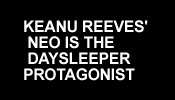|
The Matrix
has you.
What language shall we borrow to describe the length and breadth of our
captivity? We can speak of the hegemony of multinational corporations
over the human heart and mind, the preponderance of the Borg, or any of
the many worlds of Philip K. Dick who never tired of employing fresh,
outlandish articulations of how we go about lying to ourselves. But for
sheer vastness and a monstrously effective borrowing from any number of
available sources, little or nothing compares to The Matrix. Plato's
allegory of the cave, for instance, certainly conveys the notion that
we often warm ourselves by the fire of a cold delusion. But in The
Matrix, we're conceived for the purpose of being plugged in. We're
fuel for the prodigious machinery. The commodification knows no end. But
I'm getting ahead of myself.
 Keanu
Reeves' Neo is the daysleeper protagonist who, like many young (and increasingly
not-so-young) people of the western world, has been raised on digital
technology. By day, he sits in front of a computer screen in an office
cubicle. By night, he's his own man, hacking legendarily into the early
morning hours until he collapses at the computer beside his bed. The search
is on, and it knows no satisfaction. It is unceasing. And while Neo wouldn't
be able to tell you exactly what he's searching for, he has recently nailed
it down to a specific, haunting question: "What is the Matrix?" Keanu
Reeves' Neo is the daysleeper protagonist who, like many young (and increasingly
not-so-young) people of the western world, has been raised on digital
technology. By day, he sits in front of a computer screen in an office
cubicle. By night, he's his own man, hacking legendarily into the early
morning hours until he collapses at the computer beside his bed. The search
is on, and it knows no satisfaction. It is unceasing. And while Neo wouldn't
be able to tell you exactly what he's searching for, he has recently nailed
it down to a specific, haunting question: "What is the Matrix?"
Something's in the air. Something's happening, and Neo possesses at least
the beginnings of wisdom insofar as he knows that he doesn't know what
it (the something) is. Everybody's looking for answers, we might say,
but in Neo's world, it's perhaps better to admit that we don't even know
the proper questions. Most of us are too busy grabbing and accumulating
to even pause long enough to wonder or dream harder. We need a wake-up
call, probably on a daily basis. Premeditated, protective stupidity or
the non-conforming, ongoingly difficult path of being awake and alive.
Choose.
"The Matrix has you." This message makes it through Neo by way
of his computer. Its meaning will occupy the rest of the film alongside
the apocalyptic discovery of what it can and must mean to wake up. When
I first saw the film (on an Easter Sunday, appropriately enough), I couldn't
help but think that our current, oft-discombobulated generation of Western
culture was being given a sampling of language adequate to both its despair
and its hope. When Neo is first introduced to Trinity, her words are tailor-made
for the lone sojourner constantly found looking for answers (or less-than-edifying
images) by way of the computer keyboard:
Please.
Just listen. I know why you're here, Neo. I know what you've been doing.
I know why you hardly sleep, why you live alone and why, night after
night, you sit at the computer; you're looking for him...The answer
is out there, Neo. It's looking for you and it will find you, if you
want it to.
From
here, it's back to the white-collar routine where he'll wait for something,
anything, to happen. The Matrix does have him, for the time being, but
he's about to be shaken by what is doubtless the fantastic daydream of
many an employee in the workaday world of data entry. As he sits in his
cubicle, he receives a call from the legendary hacker, Morpheus, who alerts
him to the presence of "agents" who've come to take him away.
For one glorious moment, Neo's office space is transformed into a playing
field of real danger and cosmic significance. The interrogation that follows
his capture is too fantastic, in Neo's view, to be accorded the name of
reality. But as he will discover, his understanding of reality has been,
to say the least, adulterated.
2
<Prev
| Next>
Copyright
©2003 by David Dark.
Adapted from Everyday Apocalypse, published by Brazos
Press; used with permission.
|

